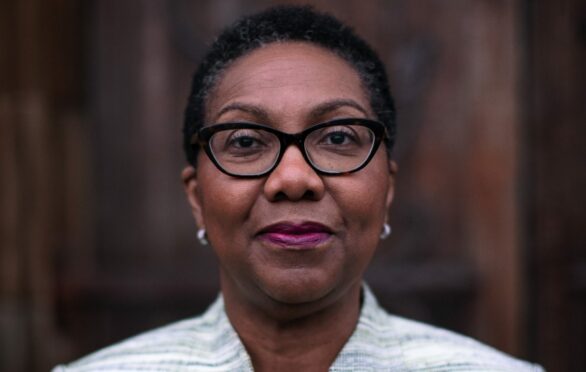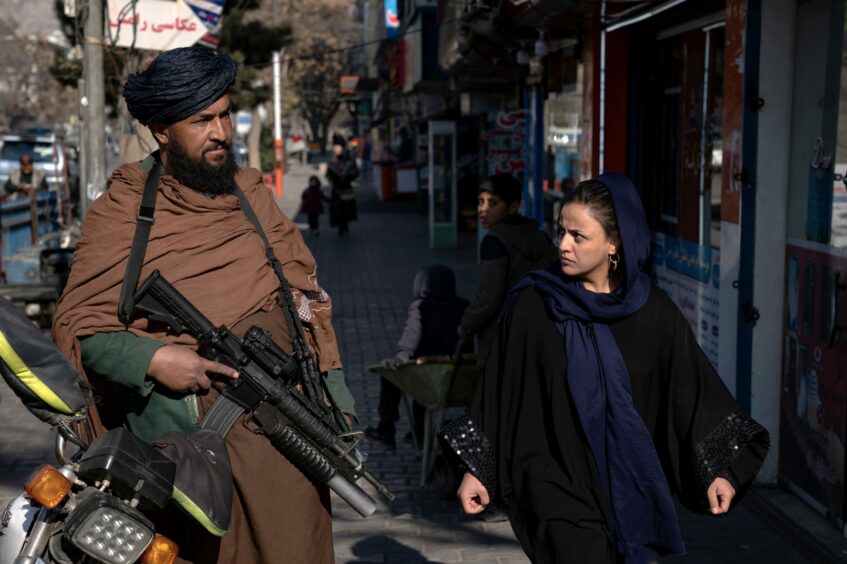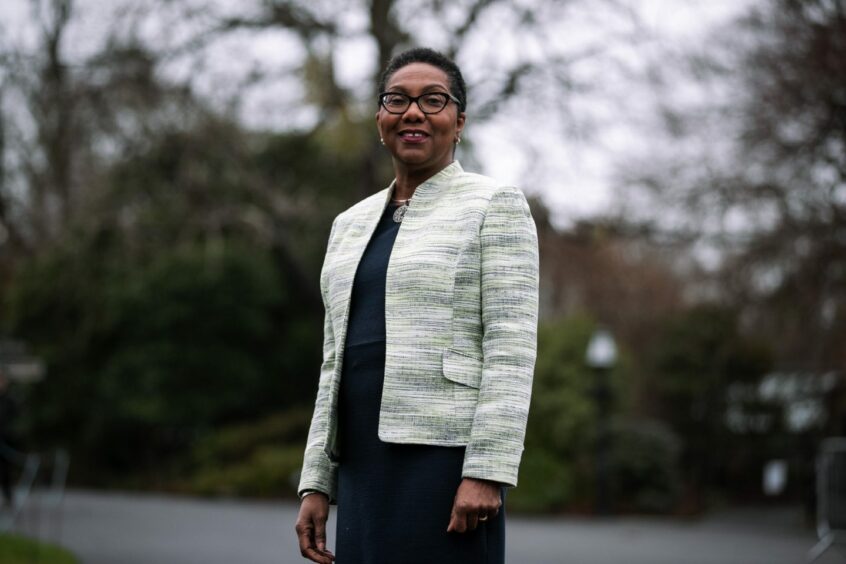
The Taliban is inflicting “heartbreaking” blows against women and girls to destroy the legacy of decades of investment, according to the prime minister’s special envoy for gender equality.
International development specialist Alicia Herbert revealed her personal despair as she watched the regime reverse years of progress in improving the lives of Afghan women.
She spoke out as the United Nations security council demands the Taliban reverse policies targeting women and girls and voices fears over the “increasing erosion” of human rights.
The Taliban has curtailed women’s rights since seizing back control of the country when Nato troops suddenly left in August 2021. Last week, it banned women from working in non-governmental organisations – non-profit groups such as charities that are independent of governmental influence – risking crucial life-saving aid and support programmes.
Herbert – who heads the Foreign, Commonwealth & Development Office (FCDO) joint HQ in East Kilbride – said: “It is really heart-breaking to see what is happening. In Afghanistan, the British Government and other governments invested a lot before the Taliban takeover in 2021.
“We were heavily invested in girls’ education there, supporting community schools and these schools were really important because you were bringing education to girls. Education for girls is a foundation. All the evidence tells you if you invest in girls, you are investing not only for this generation but also for the next generation.
“If you invest in women and girls, it means they will be more productive, they will have better lives, they will go into the workplace, and they will tend to marry later, they will have fewer children and healthier children and their families will be more prosperous. It is an investment for now and for the future. So it breaks my heart to see things as they are at the moment.”
Before banning women from working with non-governmental organisations, the Taliban had already suspended university education for women and secondary schooling for girls.
The 15-member UN security council this week said it was deeply alarmed by the increasing restrictions on women’s education, calling for “the full, equal, and meaningful participation of women and girls in Afghanistan”.
Herbert, 55, said the effects of the Taliban’s war against women would be felt in Afghanistan for many generations to come, adding: “Earlier this year, the British Government was informed that girls would return to secondary school.
“We were given assurances through various agencies this would happen. Girls were on their way to school when they were stopped. We were told there was a change of policy and they were not going to be allowed in until further notice. Here we are in December and there has been no further notice. Last week, you get things going a step further with women being blocked from university education.
“They can’t even complete their exams. Now you’re at the stage where women are not allowed to work for non-governmental organisations. This has real implications for delivery and for humanitarian aid in Afghanistan where people really need it.
“Given that investment and the importance of girls’ education and what we know it brings for the next generation, when you see that being cut back, you know we are not in a good place on this.
“They are not only sacrificing this generation but the future generation. We still provide investment at the primary level, which is still allowed at this point.
“We continue to advocate for the rights of women and girls in Afghanistan. It’s heart-breaking to see policy after policy chipping away at women’s rights. What you are seeing is a reversal of the progress that was made over the previous 20 years or so, prior to 2021.”
The Sunday Post View: Afghan women need more than our warm words and good vibes
Since 2001, the UK Government has spent about £3.5 billion in Afghanistan, of which £1.7 billion has been spent since 2014.
UK ministers and officials engage regularly with a range of Afghan women and women’s groups to ensure their policies and programmes help those who need it most.
According to the most recent UK Government figures, the UK disbursed £286 million in aid for Afghanistan last financial year. Since April 2022, a further £228m in aid has been spent in Afghanistan.
Herbert, 55, said her own upbringing had underlined the transformative power of education to shape and improve lives. She said: “I know the importance of girls’ education. I was born and grew up in Trinidad, I had parents who were passionate about education. My mother was particularly passionate about education for her girls. She felt it, she knew its importance. She was the first feminist I knew, even though she may not have recognised that term. I had five sisters, all of us given the push to be educated.
“It has been a real route for me. I went to Canada to university then came to the UK. My personal experience tells me of the power of education and when you see that potential being snuffed out for young women, then you really feel the implications.
“The way women are treated in a country is a real litmus test for a nation’s stance on human rights. When women win, everyone wins.”
Herbert has worked in troubled countries around the world. She faced danger in war-torn Sudan, took on Islamic fundamentalists Boko Haram in Nigeria, and helped combat the HIV/Aids epidemic in Mozambique.
She said: “My family worry and have often accused me of having a death wish but perhaps the move I thought hardest about was Scotland, because everyone kept telling me it rains all the time. I now say it was the best decision because we love living in Glasgow and it’s so exciting to work alongside 800 staff in East Kilbride, helping to shape the UK’s foreign policy as a force for good in the world.
“I have not come under direct threat, but that threat has been there. I lived in Sudan for three years from 2006 and there was always war. A US diplomat was assassinated not too far from my house on New Year’s Eve.
“Incidents like that shock you into remembering the environment in which you are working and what protections are needed to keep you safe.
“I helped with the UK’s contribution to the census, which was a major part of the comprehensive peace agreement.
“I was in Nigeria when Boko Haram was just seeding and by the time I left, they had become quite a force. Boko Haram literally means ‘Western education is forbidden’.
“I had colleagues working in the UN compound where 13 people were killed in a Boko Haram bomb attack in Abuja in 2011. I remember frantically sending in drivers to get our people out when they attacked Kano the same year.”
She helped spearhead the UK’s hosting of the Preventing Sexual Violence in Conflict (PSVI) conference in London at the end of last month, with Hollywood star Angelina Jolie and Ukraine’s First Lady Olena Zelenska amongst the speakers.
Foreign Secretary James Cleverly announced a three-year strategy backed by £12.5m of new funding to tackle sexual violence in conflict and more than 50 countries and the UN signed up to a new declaration on the issue.
Herbert – whose HQ is set to expand with a further 500 jobs being re-deployed from London to East Kilbride by December 2025 as part of the UK Government’s levelling-up agenda – remains proud to have played a major role in the drive to improve the lives of women and girls around the world.
She said: “Rape in war is a shocking reality of our world. Sexual violence is still all too common and we know it is happening in more than 18 conflicts around the world today.
“FCDO is putting the pursuit of equality, empowerment and ending violence against women and girls, in all their diversity, at the heart of our work. In this role, I not only have responsibility for girls’ education, but other equality issues such as LGBTQ+ rights, disability inclusion, and helping support people affected by climatic shocks.
“I was in Uganda earlier this year to visit projects we fund through the UN to support young women who have suffered sexual abuse and exploitation through early enforced marriage. It was harrowing stuff with stories of abuse from a very early age, gang rapes in school, and being forced into sex work. There was not a dry eye during those discussions.
“But it was a highlight of the past year because these young women were telling me their stories and the positive impact our programme was having on their lives, helping them get new skills to turn their lives around.”

Enjoy the convenience of having The Sunday Post delivered as a digital ePaper straight to your smartphone, tablet or computer.
Subscribe for only £5.49 a month and enjoy all the benefits of the printed paper as a digital replica.
Subscribe © Ebrahim Noroozi/AP/Shutterstock
© Ebrahim Noroozi/AP/Shutterstock © Andrew Cawley
© Andrew Cawley